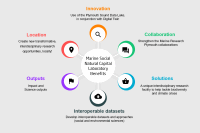Story
Europe’s First Marine Social &Natural Capital Laboratory launched at PML
04 July 2023
The Lab will be a testbed for novel and transformative marine science using integrated ecological, psychological, social and economic research approaches, coupled with cutting edge digital technologies.

 We are pleased to announce the launch of the first Marine Social &Natural Capital laboratory in Europe, here at the Plymouth Marine Laboratory (PML). The Lab is designed to explore social and human capital alongside the natural capital, including that provided by the local marine environment, Plymouth Sound, the adjacent rivers Yealm, Tamar and Plym and going several miles outside of the Breakwater.
We are pleased to announce the launch of the first Marine Social &Natural Capital laboratory in Europe, here at the Plymouth Marine Laboratory (PML). The Lab is designed to explore social and human capital alongside the natural capital, including that provided by the local marine environment, Plymouth Sound, the adjacent rivers Yealm, Tamar and Plym and going several miles outside of the Breakwater.
Natural capital is defined as the stock of natural resources and ecosystems that provide various goods and services essential for human wellbeing and the functioning of the planet. It encompasses a wide range of elements, including forests, wetlands, rivers, oceans, minerals, soil, air, and biodiversity, and represents the inherent value of nature’s assets and the ecological systems that sustain life on Earth. The ability of natural assets to provide these benefits is determined by their quality, quantity and location and can be affected by how humans use and manage them.
The term human capital refers to the collective skills, knowledge, abilities, and attributes possessed by individuals in a population. It emphasises the idea that the accumulation and enhancement of human capabilities can drive economic growth, innovation, and competitiveness. In a broader sense, social capital is a set of shared values or resources that allows human capital assets to come together in a group to effectively achieve a common purpose.
 The new Marine Social and Natural Capital Laboratory will use “whole system thinking’, to address interdisciplinary questions around ecosystem services, habitat restoration, recreation and human wellbeing, and has been designed to promote innovation, collaboration, solution development, impact and data compatibility.
The new Marine Social and Natural Capital Laboratory will use “whole system thinking’, to address interdisciplinary questions around ecosystem services, habitat restoration, recreation and human wellbeing, and has been designed to promote innovation, collaboration, solution development, impact and data compatibility.
Plymouth Sound is an ideal site for a variety of reasons. Plymouth houses three internationally renowned marine institutes: Plymouth Marine Laboratory, the Marine Biological Association and the Marine Institute of the University of Plymouth, linked together in the Marine Research Plymouth group. Therefore, Plymouth attracts high-calibre marine scientists.
Much research has also been carried out around Plymouth Sound leading to a large selection of long-term environmental datasets, extensive marine ecosystem modelling, regular satellite observations and significant investment in digital and autonomous technologies. Despite this wealth of expertise and long-term environmental data, long-term data on social capital and cultural ecosystem services provided by Plymouth Sound to its residents is lacking.
The initial research questions that will be address are:
- How do citizens engage with and benefit from Plymouth Sound – their health and well-being
- What ecosystem services does Plymouth Sound provide – and to whom?
- What are the quantifiable benefits of returning parts of the marine environment back to its original state?
To address these questions, the Lab will employ a range of measuring methods, such as footfall monitoring, interviews with user groups, resident surveys, social media analysis and location-based wellbeing experiments. It will also make use of the existing data collected around Plymouth Sound natural environments and explore how these different datasets can be linked together.
Dr Stefanie Broszeit, Marine Ecosystem Services Researcher and lead of the Marine Social &Natural Capital Laboratory, commented:
“We are really excited to launch the Marine Social &Natural Capital Lab; the first in Europe. PML has a long track record of marine socio-economic analysis, with some of the earliest marine ecosystem services and natural capital research having been undertaken by PML scientists over 20 years ago.”
“We have such a valuable marine environment on our doorstep and this new initiative will not only help us reveal the extent of natural and social capital locally but will also help uncover capital treasures around the globe.”
Prof. Nicola Beaumont, Head of Science for the Sea &Society Group at PML, added:
“The UK government has shown a commitment to incorporating natural capital into its policies and practices since the creation of the Natural Capital Committee in 2012. In 2018, the government published its 25-Year Environment Plan, which highlighted the importance of protecting and enhancing the country’s natural capital and emphasised the need to restore habitats, reduce pollution and sustainably manage natural resources. We are confident that this new initiative will be a significant contributor to achieving these ambitions.”